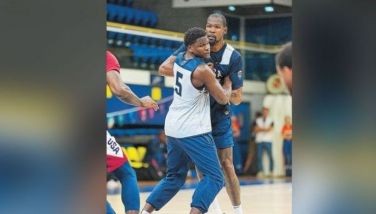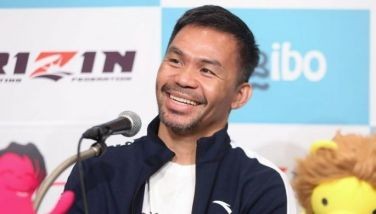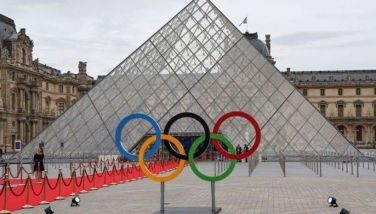Sports governance
Last week, I wrote about the talk I gave on “The Role of the State in Sports Development” on the occasion of the Sports Governance Forum organized by the University of the Philippines (UP) Circle of Administrators (an association of UP student leaders) at the Assembly Hall of the National College of Public Administration and Governance The forum was held on Friday, Sept. 21, 2012 which was the 40th anniversary of the declaration of Martial Law by Ferdinand Marcos.
I expressed the hope that the fact that the forum on governance is being held on the 40th anniversary of Martial Law was deliberate and planned rather than merely coincidental.
To lay the groundwork for the rest of the talk, I described the hours before Senator Benigno S. Aquino Jr (Ninoy) was arrested at the Manila Hilton hotel. Ninoy had spoken before a big crowd of Asian Institute of Management (AIM) students and guests at my invitation on Friday, Sept. 22, 1972 at 3 p.m. I did mention that I met Senator Aquino for the first time around mid 1971 but, after some recollection and a look at my records, our first meeting actually transpired in mid-1970 in his Senate office when I was still a student at De La Salle.
At any rate, Senator Aquino and I were to meet after his AIM speech at the Channel 5 studios then located at Pasong Tamo Extension in Makati but he later moved it to Saturday, the next day, Sept. 23, at 10 a.m. The meeting did not take place since Ninoy was arrested late Friday evening at the Hilton and brought to Camp Crame by the arresting team led by Col. Romeo Gatan early Saturday morning.
After the short narration of the fast moving events leading to Ninoy’s arrest, I asked the audience why do I go down memory lane, so to speak, by talking about events that happened 40 years ago when almost everyone in the room was not yet even born. In fact, their parents had not even met when Martial Law was declared and carried out ruthlessly.
My answer was: the use of power (or its abuse) is at the heart of governance, which is the topic of the forum.
At this point I asked, what is governance? What is good governance? As a management practitioner and based on discussions with advocates of good governance, I offered a very simple response: good governance is the prudent use of power and authority. By prudent, I mean, the use of power to benefit the common good and not an elite, favored, privileged few.
Good governance in the context of sports should contain the following features: 1.) It should be for all and go beyond a few elite athletes who, however, do deserve, unique support because of their unique role; 2.) It should be egalitarian; 3.) It should be an instrument to promote the common good; 4.) It should be an instrument to attain society’s broader goals of development, peace-building, value formation, social justice and human rights; and 5.) It should be, per United Nations prescription, an engine of development, rather than a mere by-product or as an afterthought of development.
The role of the state is therefore to provide the framework and the policies that will promote the proper role of sports agencies including the rigorous and serious preparation of a road map or Master Plan for Philippine sports that creates synergy between mass-based and elite sports. It is also the state’s responsibility to build the necessary infrastructure for producing a continuing cadre of sports experts, sports medicine people, sports science practitioners, sports psychologists and sports practitioners through entities like the Philippine Institute for Sports (PHILSPORTS) which we, on the instructions of then President Fidel V. Ramos, established at the Philippine Sports Commission (PSC) in November 1996. PHILSPORTS however has been, for all intents and purposes, killed by succeeding PSC administrations.
There are various models of government involvement and intervention in sports. The American model calls for the non-involvement of government in sports, it being an “idyllic activity” that is better left to the private sector. Except for a law governing Little League baseball, the formation of the National Collegiate Athletic Association because of injuries arising from American football around 1910-1915 and the boycott by the United States of the Moscow Olympics in 1980 in protest over the Soviet invasion of Afghanistan, the U.S. government has not intervened in elite sports.
In contrast, the concept of Sports for All encourages (and even requires) government intervention and involvement in ensuring that sports is a venue for health and wellness, an extension of classroom education for social transformation and for peace-building and partnership in a global community.
Next week, more on our talk on The Role of the State in Sports Development at the Sports Governance forum.
- Latest
- Trending




























